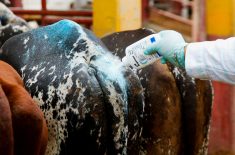Toronto/Ottawa | Reuters — Ontario has started testing about 8,000 migrant farm workers for COVID-19 in a hard-hit rural region of the province after two young workers died and the coronavirus was found on at least 17 farms, according to the local public health authority.
The Ontario outbreak has centred on farms in the Windsor-Essex region, across from the Michigan border. Canadian farmers rely on 60,000 temporary foreign workers predominantly from Latin America and the Caribbean to plant and harvest crops.
Two workers from Mexico, aged 24 and 31, have died in recent days after contracting the virus. The provincial coroner is investigating the death of the 31-year-old worker.
Read Also

U.S. not ready to lift Mexican cattle ban over screwworm, Agriculture Secretary Rollins says
The U.S. is not yet ready to reopen its border to Mexican cattle amid an outbreak of the flesh-eating New World screwworm parasite, Agriculture Secretary Brooke Rollins said, but she is pleased with Mexico’s efforts to contain the pest.
Nurses, doctors and paramedics, including home care nurses who speak Spanish, are going to farms to check on sick workers and ensure exposure to the virus is contained, said Erie Shores hospital chief of staff Ross Moncur.
“The impact on the individuals has been more severe than we would have anticipated,” he said. “Going into this, we would have said, temporary foreign workers are young, healthy, folks in general… but we’ve seen some severe cases.”
About 200 farm workers have tested positive for the coronavirus, said Wajid Ahmed, medical officer of health for Windsor-Essex.
“We’re dealing with an emergency,” said Ahmed, whose unit is considering a new binding order to improve worker accommodations.
The order could limit the number of people who can isolate together, require employers to make it easier for public health to reach workers, and set standards for food in isolation.
Moncur said transportation, language and cultural barriers mean workers have not received as much follow-up care as people with COVID-19 usually would in Canada.
Farm workers, who often live in bunkhouses, are entitled to healthcare in Canada.
“Bunkhouses on farms for migrant workers are, relative to other things in Canada, very crowded spaces, in which transmission is very easy,” said Allison McGeer, an infectious disease expert from Toronto’s Mount Sinai hospital.
Public health advocates had warned that shared housing could put workers in danger.
Scotlynn Group, a fruit and vegetable farm in Norfolk, another rural area with a large migrant worker population, has reported 164 cases — two severe enough to require hospitalization — among 216 migrant workers. The farm has been working closely with local health authorities.
“It’s been difficult to keep the operation going and to see our men infected with this virus. It’s been rattling,” Scotlynn Group owner Scott Biddle told Reuters.
Labour ministry data requested by Reuters showed that Scotlynn Group was the subject of a complaint about a “lack of COVID-19 measures” one week before its first reported case on June 2. It declined to give further details.
Biddle said the ministry has visited the farm twice and did not find any problems.
— Reporting for Reuters by Allison Martell in Toronto and Kelsey Johnson in Ottawa.











